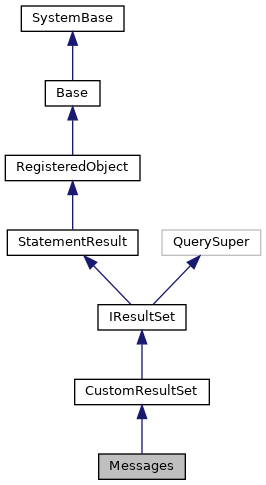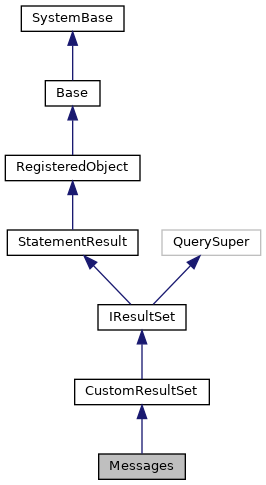

Public Member Functions | |
| _.Library.Status | OpenCursor () |
| Implement code to open the cursor here. More... | |
 Public Member Functions inherited from CustomResultSet Public Member Functions inherited from CustomResultSet | |
| _.Library.Status | CloseCursor () |
| Implement CloseCursor to clean up any temporary structures that are used by the custom. More... | |
| _.Library.Status | OnClose () |
| This callback method is invoked by the <METHOD>Close</METHOD> method to. More... | |
 Public Member Functions inherited from RegisteredObject Public Member Functions inherited from RegisteredObject | |
| _.Library.Status | OnAddToSaveSet (_.Library.Integer depth, _.Library.Integer insert, _.Library.Integer callcount) |
| This callback method is invoked when the current object is added to the SaveSet,. More... | |
| _.Library.Status | OnConstructClone (_.Library.RegisteredObject object, _.Library.Boolean deep, _.Library.String cloned) |
| This callback method is invoked by the <METHOD>ConstructClone</METHOD> method to. More... | |
| _.Library.Status | OnNew () |
| This callback method is invoked by the <METHOD>New</METHOD> method to. More... | |
| _.Library.Status | OnValidateObject () |
| This callback method is invoked by the <METHOD>ValidateObject</METHOD> method to. More... | |
Public Attributes | |
| Message | |
| More... | |
Private Member Functions | |
| Display (_.Library.String pDelimiter) | |
| Displays the contents of this object on the current device. | |
| DisplayFormatted (_.Library.String pFormat, _.Library.String pFileName, _.SQL.Manager.Messages pMessages, _.Library.String pFilesUsed, _.Library.String pTranslateTable, _.Library.String pDelimiter) | |
| _.Library.Integer | Next (_.Library.Status sc) |
| Advance to the next row in the result referenced by ProcCursor. More... | |
Private Attributes | |
| __AtEnd | |
| More... | |
| __Messages | |
| More... | |
Additional Inherited Members | |
 Static Public Attributes inherited from CustomResultSet Static Public Attributes inherited from CustomResultSet | |
| statementactual | |
 Static Public Attributes inherited from IResultSet Static Public Attributes inherited from IResultSet | |
| StatementIndexHash | |
| Hash of associated statement index entry. | |
 Static Public Attributes inherited from RegisteredObject Static Public Attributes inherited from RegisteredObject | |
| CAPTION = None | |
| Optional name used by the Form Wizard for a class when generating forms. More... | |
| JAVATYPE = None | |
| The Java type to be used when exported. | |
| PROPERTYVALIDATION = None | |
| This parameter controls the default validation behavior for the object. More... | |
|
private |
Display the contents of the result object. If formatted display is available then format the results
using the requested format and, if appropriate, open the formatted results using the host OS. The output is directed to one or more files and messages are placed in a result set object. All file names used are returned in an array.
| Name | Description | ||||||||||
|---|---|---|---|---|---|---|---|---|---|---|---|
| pFormat |
The format applied to the result content. This parameter is also used to determine the file name extension. Supported formats are:
If pFormat is specified as any number not listed above then it will default to TXT. pFormat can also be specified as XML, HTML, PDF, or TXT. | ||||||||||
| pFileName |
The base file name to be used to generate actual file names used for output. If no value is specified then a file name will be generated, using the TEMP folder defined for the InterSystems IRIS instance. This value is not expected to include an extension. An extension is added to this value to form the actual file used. Also, if nested results exist then a number is appended to the file name specified to produce a unique name for each result. | ||||||||||
| pMessages |
Instance of a system result set class. If no value is passed then the system message result class is instantiated. This parameter is passed by reference. It is up to the caller to process the result set oref that is returned. pMessages.Count() returns the number of messages contained in the result set. pMessages.Display() will display the messages on the current device. pMessages.DisplayFormatted() is also implemented and can be used to display the messages using the selected format. | ||||||||||
| pFilesUsed |
This pass-by-reference parameter will contain the number of files used to display the result content and the name of each file. pFilesUsed is the number of files and pFilesUsed(file_number) is the name of the file. The sequence of the files is the same sequence as the results are processed. For simple result objects, there is a single file. For context objects that can contain result set sequences, the results are output in the order they are returned and the files used are present in pFilesUsed in that same order. | ||||||||||
| pTranslateTable |
This is the translate table used for the output files when the format is CSV or TXT. This parameter is optional. | ||||||||||
| pDelimiter |
The delimiter to use between columns in the export file. This parameter is optional and defaults to tab character if not specified. |
|
private |
Advance to the next row in the result referenced by ProcCursor.
Returns 0 if the cursor is at the end of the
result set. An optional argument contains a Status value on return. This Status value indicates success or failure of the Next call. SQLCODE is also set by Next. This implementation is overridden by classes that implement the result set interface.
Reimplemented from StatementResult.
| _.Library.Status OpenCursor | ( | ) |
Implement code to open the cursor here.
You may also define new formal arguments. Any arguments defined
will be automatically added to the constructor interface and callers can specify actual arguments in the call to New().
method OpenCursor(pBeginDate as Date = "", pEndDate as Date = "") as Library.Status [ private ]
{
set ..BeginDate = pBeginDate
set ..EndDate = $Select(pEndDate'="":pEndDate,1:$H)
quit $$$OK
}
Given the above example implementation of OpenCursor, the following is a valid call to instantiate a new instance.
set tResult = ##class(MyCustom.ResultSet).New(,$H-30,$H-10)
To report an error from OpenCursor just set ..SQLCODE and Message to appropriate values. To report no rows found, set SQLCODE to 100. Errors are indicated by negative ..SQLCODE values.
Reimplemented from CustomResultSet.
|
private |
| Message |
|
private |